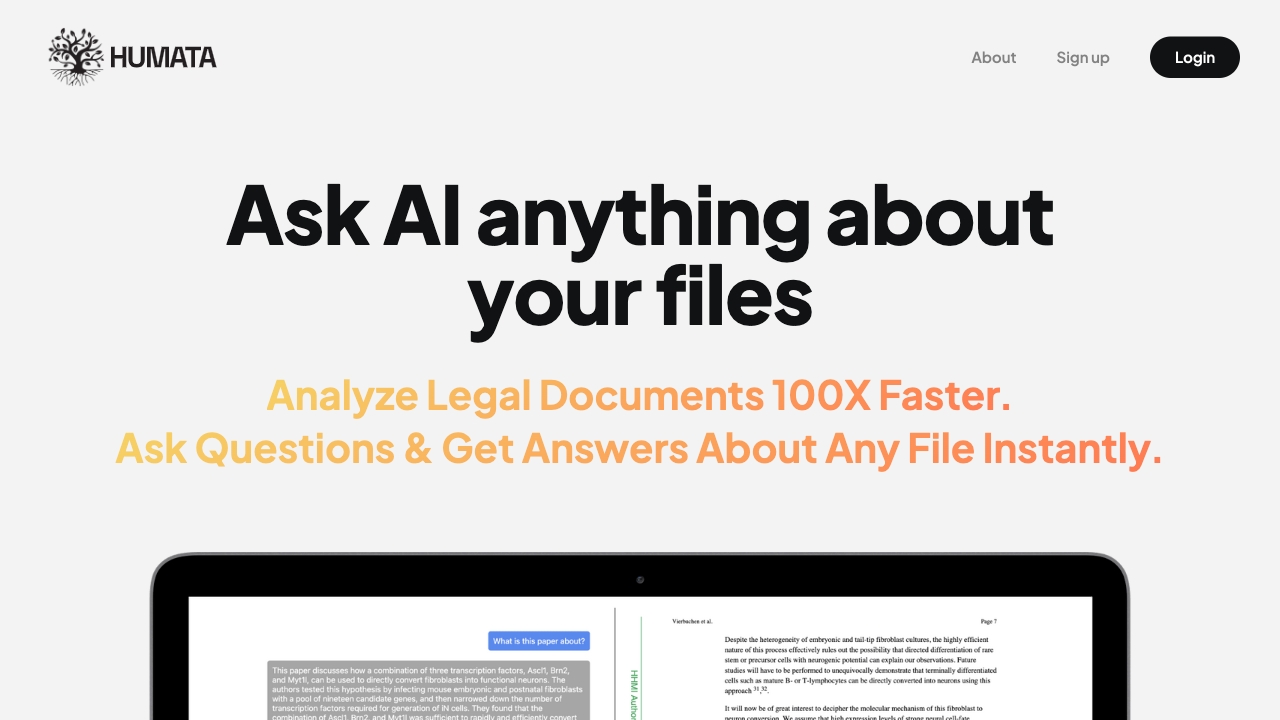- Home
- AI Summarizer
- Humata

Humata
Open Website-
Tool Introduction:Ask your PDFs anything—instant summaries, compare docs, sourced answers
-
Inclusion Date:Oct 21, 2025
-
Social Media & Email:
Tool Information
What is Humata AI
Humata AI is an intelligent document assistant that helps you understand long, complex files—especially PDFs—without reading every page. Upload files, ask natural-language questions, and get concise answers grounded in your documents. It can summarize sections, extract key data points, compare versions, and search across multiple files to surface relevant passages. By turning unstructured content into actionable insights, Humata AI speeds up report writing, technical research, and legal review while improving accuracy and consistency. Teams use it to centralize knowledge and reduce repetitive analysis.
Humata AI Main Features
- Document Q&A: Ask questions in plain English and receive context-aware answers sourced from your uploaded PDFs and other supported files.
- Summarization: Generate concise summaries, outlines, and key takeaways from lengthy documents to accelerate comprehension.
- Multi-file Search: Perform semantic and keyword search across multiple documents to find relevant sections quickly.
- Comparison: Compare documents or versions to highlight differences, conflicting statements, and changes.
- Data Extraction: Extract definitions, figures, and key facts to build notes or draft reports more efficiently.
- Follow-up Reasoning: Refine queries with follow-up questions to drill deeper into complex topics.
- Result Traceability: Review the passages used to answer questions to validate claims and maintain auditability.
Who Should Use Humata AI
Humata AI suits researchers, analysts, students, legal professionals, consultants, and operations teams who work with dense PDFs or knowledge-heavy documents. It is ideal for technical documentation review, legal document analysis, RFP responses, policy and compliance work, academic literature reviews, and any scenario that requires fast, reliable understanding of long files.
How to Use Humata AI
- Create an account and sign in.
- Upload your files (e.g., PDFs); organize them by project if needed.
- Wait for processing so the system can index and understand the content.
- Ask natural-language questions about the documents, such as “Summarize section 3” or “What are the key risks?”
- Use follow-up prompts to refine results or request summaries, outlines, and data points.
- Compare documents or versions to identify differences and inconsistencies.
- Export insights to your notes or report drafts and cite the relevant passages.
Humata AI Industry Use Cases
In legal services, teams use Humata AI to review contracts, extract clauses, and speed up due diligence. In research and academia, it accelerates literature reviews and synthesizes findings across papers. Financial analysts use it to analyze filings and investor reports, while compliance teams scan policies and SOPs for requirements. Product and engineering teams summarize technical specs and change logs to align stakeholders.
Humata AI Pricing
Humata AI typically follows a tiered subscription model, with a limited free plan for basic use and paid plans that expand page limits, performance, and collaboration features. Trials or demos may be available. For current plan details and caps, check the official pricing information.
Humata AI Pros and Cons
Pros:
- Speeds up understanding of long, complex PDFs with accurate, context-aware answers.
- Summarizes and compares documents to reduce manual review time.
- Searches across multiple files to surface relevant passages quickly.
- Supports iterative questioning for deeper analysis and clarity.
- Helps produce consistent report drafts and documented reasoning.
Cons:
- Quality depends on the document’s text layer; scanned PDFs without good OCR may yield weaker results.
- Highly specialized or ambiguous queries may require careful prompt refinement.
- Large files or heavy workloads can introduce processing delays.
- Answers are limited to the content you upload and may miss external context.
- Advanced features and higher limits are usually locked behind paid tiers.
Humata AI Popular Questions
-
Q1: Can Humata AI handle scanned PDFs?
It works best with PDFs that include a selectable text layer. Scanned files may require OCR; quality of extraction will affect answer accuracy.
-
Q2: Does it support multiple files at once?
Yes. You can upload multiple documents, search across them, and ask cross-file questions to aggregate insights.
-
Q3: Can it show where an answer came from?
Humata AI surfaces relevant passages to help you verify answers and trace them back to the source pages.
-
Q4: What file formats are supported?
It is designed primarily for PDFs and commonly used document formats. Check the official documentation for the current list of supported types.
-
Q5: Is my data kept private?
Your files are used to generate answers for your workspace. For retention, access, and security details, review the official privacy policy and settings.



